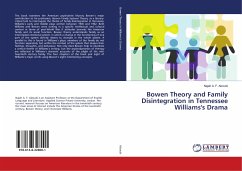
Bowen Theory and Family Disintegration in Tennessee Williams's Drama
Versandkostenfrei!
Versandfertig in 6-10 Tagen
46,99 €
inkl. MwSt.

PAYBACK Punkte
23 °P sammeln!
This book examines the American psychiatrist Murray Bowen's major contribution to his profession, Bowen Family Systems Theory, as a literary-critical tool to interrogate the theme of family disintegration in Tennessee Williams's early and middle plays written between 1945 and 1962. Both Williams and Bowen were writing in a specific intellectual and cultural context in terms of post-World War II attitudes towards the American family and its social function. Bowen theory understands family as an interrelated emotional system, in which a change in the functioning of one part of the system directl...
This book examines the American psychiatrist Murray Bowen's major contribution to his profession, Bowen Family Systems Theory, as a literary-critical tool to interrogate the theme of family disintegration in Tennessee Williams's early and middle plays written between 1945 and 1962. Both Williams and Bowen were writing in a specific intellectual and cultural context in terms of post-World War II attitudes towards the American family and its social function. Bowen theory understands family as an interrelated emotional system, in which a change in the functioning of one part of the system directly relates to changes in the whole system. A parallel to this is found in Williams's plays: members of the family do not function separately, but within the context of the system that shapes their feelings, thoughts, and behaviour. Not only does Bowen help to elucidate a central theme of Williams's writing, but the psychodynamics of therapy are reflected in Williams's dramatic accounts of theplight of the mid-twentieth century family. The four chapters of the book pair eight of Williams's major works using Bowen's eight interlocking concepts.












